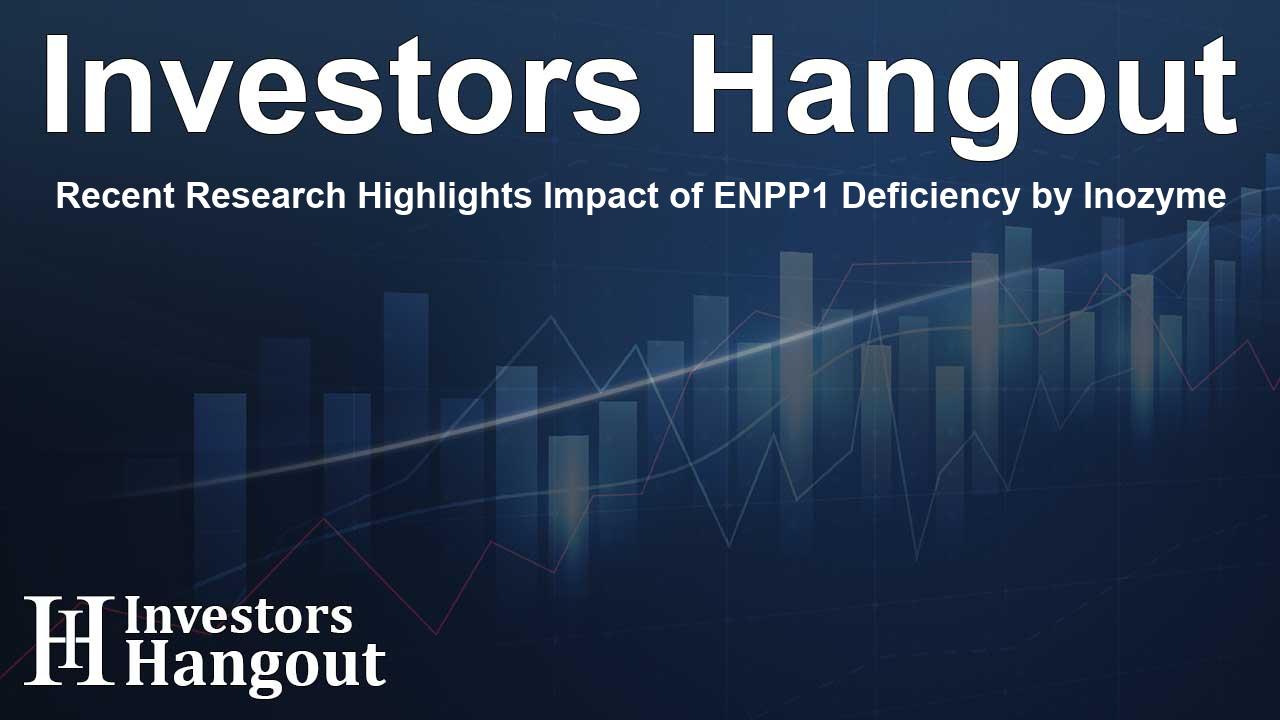Recent Research Highlights Impact of ENPP1 Deficiency by Inozyme

Inozyme Pharma's Research Reveals Critical Insights on ENPP1 Deficiency
Inozyme Pharma, Inc. (Nasdaq: INZY) is making strides in understanding ENPP1 Deficiency, a rare condition significantly impacting individuals' bone health and cardiovascular functions. The recent publication of a pivotal paper in JBMR Plus sheds light on the severity and progression of this condition, offering fresh insights gathered from the largest retrospective analysis conducted on ENPP1 Deficiency.
Data revealed from this comprehensive study highlights the considerable, systemic nature of ENPP1 Deficiency. It often presents with serious cardiovascular complications and musculoskeletal issues, especially from infancy, evolving through childhood and into adulthood.
Key Findings From the Retrospective Study
The publication titles, "Phenotypic characterization of ENPP1 deficiency: generalized arterial calcification of infancy and autosomal recessive hypophosphatemic rickets type 2," was a collaborative effort that involved researchers from top institutions, including experts from the National Institutes of Health (NIH) and Münster University Children’s Hospital. The analysis of data concerning 84 individuals with ENPP1 Deficiency showed alarming trends:
- Over 95% of patients face severe complications related to cardiovascular and musculoskeletal systems by the age of 55.
- Infants typically show signs of arterial calcification within the first few months of life, with symptoms like respiratory distress and heart failure often requiring acute medical intervention.
This data presents a compelling case for the urgent necessity of timely diagnosis and intervention.
The Impact of Early Diagnosis
The need for improving care and treatment for patients with ENPP1 Deficiency cannot be overstated. With 60% of patients presenting cardiovascular issues entirely independent of a GACI diagnosis, the research indicates an overwhelming trend that demands attention.
The research underscores that many individuals diagnosed within infancy face developmental challenges. With details showing that many patients require coordinated multidisciplinary care, it emphasizes an essential shift towards recognizing and addressing these health challenges early in life.
Understanding ENPP1 Deficiency
ENPP1 Deficiency is a progressive rare disease affecting blood vessels and bone tissue. It often manifests as Generalized Arterial Calcification of Infancy (GACI) or Autosomal Recessive Hypophosphatemic Rickets Type 2 (ARHR2), leading to a spectrum of health challenges throughout life.
Children and adults suffering from this condition experience varying degrees of symptoms, from weakened bones to calcifications in cardiovascular systems, emphasizing the intricate link between bone health and overall bodily functions.
Current Status of Treatment Options
As of now, there are no approved therapies specifically targeting the needs of individuals with ENPP1 Deficiency. However, the company’s investigational therapy INZ-701 presents an optimistic potential for treatment. This diagnostic approach emphasizes restoring critical pathways that regulate bone and vascular health, aiming to provide lasting solutions for patients grappling with this debilitating condition.
Call for Expanded Research and Support
The intricate nuances regarding ENPP1 Deficiency highlighted by Inozyme Pharma's recent publication stress the critical need for research expansion and support for affected families. Recognizing the urgent need for innovative treatments and interventions is paramount to draw a clearer path for future research and clinical applications.
Through collaborative efforts with the scientific community, patients with ENPP1 Deficiency may gain the hope of a better quality of care and improved health outcomes in the future.
Frequently Asked Questions
What is ENPP1 Deficiency?
ENPP1 Deficiency is a rare genetic disorder leading to significant cardiovascular and musculoskeletal complications, primarily impacting infants and young children.
What are its primary symptoms?
Symptoms often include generalized arterial calcification, rickets, and potential complications affecting bone and cardiovascular health throughout life.
Why is early diagnosis important?
Early diagnosis is critical as it enables timely intervention, which can significantly improve patient outcomes and quality of life.
What treatments are currently available?
Currently, no specific treatments have been approved for ENPP1 Deficiency, but investigational therapies like INZ-701 are in development.
How can I learn more about Inozyme Pharma?
For additional information, you can visit Inozyme Pharma’s website or follow them on their social media platforms.
About The Author
Contact Ryan Hughes privately here. Or send an email with ATTN: Ryan Hughes as the subject to contact@investorshangout.com.
About Investors Hangout
Investors Hangout is a leading online stock forum for financial discussion and learning, offering a wide range of free tools and resources. It draws in traders of all levels, who exchange market knowledge, investigate trading tactics, and keep an eye on industry developments in real time. Featuring financial articles, stock message boards, quotes, charts, company profiles, and live news updates. Through cooperative learning and a wealth of informational resources, it helps users from novices creating their first portfolios to experts honing their techniques. Join Investors Hangout today: https://investorshangout.com/
The content of this article is based on factual, publicly available information and does not represent legal, financial, or investment advice. Investors Hangout does not offer financial advice, and the author is not a licensed financial advisor. Consult a qualified advisor before making any financial or investment decisions based on this article. This article should not be considered advice to purchase, sell, or hold any securities or other investments. If any of the material provided here is inaccurate, please contact us for corrections.
